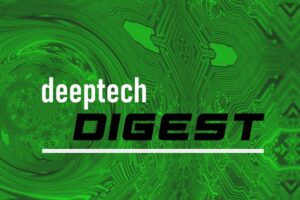Lithuania, a Baltic country in Northern Europe, has already proved its value on the world’s life sciences stage.
Aiming for the sector to reach 5% GDP by 2030, the state has almost doubled the industry growth in recent years. The growth hotspot in the Baltics has a robust ecosystem with life sciences sector revenues of around €2 billion.
What are the essential accelerators of such growth? The list includes strong R&D capabilities, a diverse talent pool with 49% of women in STEM, and constant government support.
“Life sciences is one of Lithuania’s priority sectors. No surprise state has been demonstrating record life sciences development for almost a decade and is among the fastest-growing industry examples in Europe. With today’s potential, we expect to keep this pace further,” said Romualda Stragienė, director at Innovation Agency Lithuania, an official agency under the Ministry of Economy and Innovation of the Republic of Lithuania, established to develop Lithuania’s innovation ecosystem.
“We have a strong combination of world-known companies such as Northway Biotech and Thermo Fisher, as well as promising startups. They contribute significantly to the growth of both Lithuania’s and global life sciences. From the AI-driven protein design and next-generation therapeutics development to gene editing and solutions revolutionizing the mental health and well-being industry – Lithuanian startups truly have a lot to offer,” said Andrius Sliuzas, key account manager for life sciences at Innovation Agency Lithuania.
Biomatter
Biomatter is a synthetic biology company established in 2018 that creates new proteins for health and sustainable manufacturing.
The company has developed the Intelligent Architecture platform that addresses current engineering approaches’ limitations to unlock new horizons for digital protein design and development.
Biomatter partners with leading companies from diverse industries (incl. biotherapeutics, chemical manufacturing, and molecular biology tools) to create new products and technologies based on unique enzymes that capture existing markets and enable blue-ocean opportunities.
Last year, the startup gained its co-founders a spot in Forbes’ 30 Under 30 – Europe – Science & Healthcare list.
Caszyme
Caszyme is a biotech company specializing in developing and applying CRISPR Cas technology.
Since different industries and applications that use CRISPR-Cas technology require molecular tools with different characteristics, Caszyme offers a platform of different CRISPR-based Cas proteins. The company identifies, characterizes, and develops these proteins and delivers them to clients for applications in human therapeutics, diagnostics, agriculture, research tools, and industrial biotech. Also, based on a client’s needs, Caszyme collaborates on identifying and characterizing novel CRISPR-based molecular mechanisms with the required specifications.
Caszyme enables its clients and partners with company R&D services to apply CRISPR Cas proteins for various commercial solutions, such as new diagnostic tools, human treatment methods, new plant species, or reagents for scientific labs.
Delta biosciences
Delta biosciences is developing a supra-high-throughput molecular screening platform to help pharmaceutical researchers accelerate drug discovery campaigns. Delta’s proprietary engine leverages pico-fluidic throughputness to enable rapid screening cycles for small-molecule candidates. Additionally, the team employs a direct evolution-led chemical library-building strategy that is enhanced by an integrated, ML-supported feedback loop between in silico predictions and in vitro data.
This new-gen drug discovery approach helps medicinal chemists test hypotheses in weeks – unlocking order-of-magnitude savings in both time and resources compared to traditional screening processes.
Founded in 2020 and featuring alumni from Cambridge, UCL, Crick Institute, and University of Geneva, among others, Delta biosciences has secured more than $1.2 million in funding. The company is also collaborating with CERN Technologies, participating in the EIT Health Catapult’s 2022 Semi-Finals, and advancing a pilot partnership with a leading medical school in the UK.
Droplet Genomics
Droplet Genomics aims to make high throughput analysis technologies accessible to molecular and cell biology labs. The company provides easy-to-use platforms and novel technologies for isolating and analyzing individual cells or molecules in picoliter-sized compartments, empowering researchers to study biological samples at the ultimate single-cell resolution.
Founded in 2016, the company has already commercialized two droplet microfluidics platforms – Onyx and Styx – to enable droplet generation and manipulation for various assays, such as single-cell sequencing and high throughput screening (e.g., antibody discovery or directed protein evolution). More than 40 academic and industrial R&D labs already use these platforms worldwide.
Droplet Genomics is actively innovating to remove the barriers to the experimental design posed by conventional droplet microfluidics. This year the company will launch a product line based on the semi-permeable capsule technology. Capsules are hollow compartments that allow reagent exchange between the capsule’s core and the surrounding medium, opening doors for massively parallel multi-step processing of single cells. This, in turn, enables high-throughput single-microbe sequencing, multi-omics analysis, and many more applications that are not amenable to the traditional droplet format.
Genie Biotech
Genie Biotech is a UK/Lithuania-based startup developing novel conjugation technologies to improve existing and new biologics. GenieTAG, the company’s first commercially available product, is a small molecular weight site-specific, highly hydrophilic “linker”. It introduces a single azide functional group to the protein of interest in a simple, quick, and non-enzymatic way. This all comes with the added benefit of allowing the end-user to (optionally) remove the installed linker via a controlled reversible reaction, leaving the native protein untouched.
After GenieTAG has been installed on a protein of interest, the azide-functional group opens the door to various payloads that can be conjugated via “Click Chemistry” – a recent technique awarded the Nobel Prize in 2022.
The company first showcased the use of ‘GenieTAG’ technology, applying it to assemble a preclinical SARS-CoV-2 vaccine candidate. The Receptor Binding Domain (RBD) antigen was linked, via GenieTAG, to virus-like-particles (VLPs). The site-specific conjugation of the antigen onto the VLP nanoparticle surface created powerful immunogens that generated better neutralizing antibodies compared to antigens attached via the ‘classical’ lysine-based conjugation strategy.
This can be attributed to the linker’s ability to correctly orient the display of antigens in a way that closely mimics the virus’s native structure, which, combined with the elimination of inter-particle cross-linking (common in other conjugation chemistries) induces efficient B-cell receptor cross-linking.
Genie Biotech currently supplies and collaborates with laboratories worldwide to develop new prophylactic and therapeutic vaccines, theranostics, diagnostics, and masked therapeutics.
Integral Solutions
Founded in 2021 in Kaunas, Lithuania, Integral Solutions aims to revolutionize the mental health and well-being industry by developing next-generation precision microbiome-based therapeutics. The company uses novel CRISPR genome engineering on probiotic bacteria to enhance the production of important metabolites for the CNS. These metabolites include key neurotransmitters, immunomodulatory compounds, and SCFAs.
By 2030, there will be over 2 billion people with mental health disorders, and the cost of mental health problems to the global economy will amount to $16 trillion. To help handle this global crisis, Integral Solutions is developing safe and effective solutions that will revolutionize the way mental health disorders are treated.
The startup connects nature, science, and the most advanced technologies to optimize human health and performance.
The company is already selling its first psychobiotic supplement EasyMind under its brand Integral Biotics in the Lithuanian and Polish markets and is planning on expanding to other European markets in 2023.
Kilo Health
With offices in Sweden (Stockholm), Latvia (Riga), Germany (Berlin), and Lithuania (Vilnius, Kaunas, Klaipeda), Kilo Health is a global digital health and wellness company that has more than 4 million customers worldwide, mostly in the US. Kilo Health’s portfolio contains over 30 innovative digital health products in chronic disease management, mental health improvement, and healthy habit change.
In 2021, the startup was listed as the second fastest-growing company in Europe by Financial Times TOP1000.
The company runs an investment program called Kilo Ventures and, starting in 2021, has already invested more than €2 million in health tech startups Pulsetto, Medical Score, and Tyler.Health, and Revolab. Kilo Health also has a startup incubator Kilo Co-Found, upskilling program Kilo Academy, and offers its products to business clients (four B2B programs). Since 2021, Kilo Health has been a member of the DTx Alliance, Matter Community, and HealthXL.
Ligence
Ligence is a deep-tech company developing AI solutions in medical imaging. The company aims to bring timely, high-quality medical imaging analysis for everyone’s needs.
Ligence Heart is a CE-marked AI tool that automates the analysis and reporting of echocardiography study analysis. The tool enables cardiologists to skip manual measurements during the procedure and saves at least 40% of total examination time, leading to shorter waiting times. Also, it significantly reduces intra and inter-operator variability, improving overall accuracy. Clinical trial data showed that the software is non-inferior to human operators, reaching an accuracy of up to 93% and making the analysis of measurements up to four times faster.
The Ligence team includes medical doctors with experience in deep learning and business development. The company plans to expand to the US and introduce solutions tailored to portable ultrasound devices.
Psylink
Psylink is developing a biosynthesis platform that outperforms current production methods, ensuring green, sustainable, and cost-efficient production of psychedelic compounds. Compared to alternative methods, biosynthesis in yeast by precision fermentation offers many benefits. Extraction from natural sources is unreliable due to varying and low levels of active compounds within the fungi, and chemical synthesis is costly and generates toxic waste. With biosynthesis, yeast cells serve as mini-factories that can grow on cheap non-complex mineral media.
Additionally, this versatile platform offers the potential to build a library of new proprietary molecules with therapeutic benefits for mental diseases. The company has recently synthesized classical psychedelics and novel psychoactive chemical entities. It is entering into preclinical research to validate its therapeutic effect in animal models with depression.
Sanobiotec
Established in early 2019 to investigate hemp-derived cannabinoids for cancer treatment, Sanobiotec quickly turned into a group of SPVs focused on R&D development, preclinical studies investigation of active cannabinoid materials for specific ailment treatment, and early-stage commercialization.
A recent success of the Sanobiotec group is the accomplishments of its unit Sanobiotec NOVUS. The company is now one of the largest in Europe and one of the top 5 global minor cannabinoid production factories. Based in Vilnius, Sanobiotec NOVUS focus exceptionally on the highest quality ingredient production and international distribution. Starting from scratch in 2020, the company is already entering the US and JP markets due to its organic expansion strategy.
After success in the highly competitive cannabinoid business, Sanobiotec R&D now targets more advanced DNA production businesses and aims to become a market standard for high-quality DNA.
Jim Cornall is editor of Deeptech Digest and publisher at Ayr Coastal Media. He is an award-winning writer, editor, photographer, broadcaster, designer and author. Contact Jim here.





